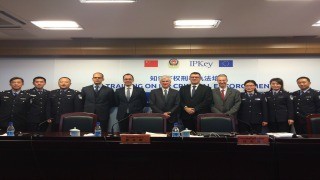
Training Conference on IPR Criminal Enforcement
Infringements of IPR and, particularly, counterfeiting and piracy, are a ceaselessly growing phenomenon, which nowadays has an international dimension, representing a serious threat to national economies that appears to be more and more linked to transnational organized crime.
Counterfeiting is still wrongly considered by public opinion as a “victim-less” crime, while the impact of IPR infringements on legal economy and the role of international organized criminal organizations is widely underestimated also by policy makers, not only in China.
A large number of recent studies (among all, see UNICRI reports) show that Chinese criminal organizations have established close cooperation with EU based criminal organizations, thanks to a low-risk criminal enforcement framework, compared to other crimes such as drug or human being trafficking.
Over the years, China has adopted a set of measures to increase cooperation between administrative law enforcement organs, public security organs and people’s prosecutors with respect to the strengthening of criminal enforcement mechanisms.
IP Key and MPS partnered in the organization of a training-conference on “IPR Criminal Enforcement”, aimed to give an overview of the EU laws as well as insights on the development of new evidence-gathering techniques adopted in recent years, to fight IPR crimes on the physical and digital market, with specific focus on:
- Organized crime;
- Pharmaceutical industry and threat to public health;
- Online infringement.
Particular emphasis was also put on international cooperation instruments.
The trainings therefore covered, inter alia:
(a) General issues encountered by law enforcement agencies in prosecuting IPR crimes, including comparative analysis;
(b) IPR criminal enforcement practice and case analysis, also with regards to online infringements (tracking sources of online infringement); calculation of fines and penalties in IPR offences; participation of private parties in IPR criminal investigations;
(c) Enforcement databases and contributions by private parties in the investigations and collection of evidence;
(d) Investigation techniques in IPR crimes, including online infringement; procedural matters, including criteria for the assessment of territorial jurisdiction;
(e) IT tools in the IPR criminal enforcement;
(f) Coordination of cases involving different Police Corps;
(g) The impact/role of international crime in IPR counterfeiting and measures that should be further adopted by policy makers;
(h) Case analysis on general criminal IPR issues;
(i) Criteria for the calculation of values (criminal thresholds) in the acceptance of criminal cases; transfer of cases between administrative and criminal authority;
a) Coordination between civil, criminal and administrative enforcement agencies. Best practices in the transfer of cases (between offices of the same administration and/or between different enforcement agencies);
b) International cooperation, especially in the exchange of intelligence and evidence in relation to organized crime operating EU-China traffics.
Key speakers
Mr Enrico Spano’, Gdf
Mr Christian Tournie, Gendarmerie
Mr. Thanassis Zemberis, IFPI
Mr Benoit Lory, EUD (on behalf of EU OBS)
Ms Duan Yuping, NCAC
Mr Sun Jun, Shanghai PSB
Mr Li Qunying, GACC
Opening/closing remarks
Mr. Benoît Lory, EUD Trade Section
Mr Cao Yingping, DDG Economic Crime Section MPS
Mr. Wu Yaozhang, Director of Jiangsu Police School
Moderation:
Mr. Zhang Peng, DDG MPS IP Division
Mr Davide Follador, IP Key LTE
Through detailed case examples, the EU and Chinese speakers further described difficulties and key points in the investigation and fight against IPR crimes, as well as investigation methods, their development in the following criminal proceedings, the importance of inter-agency cooperation as well as of international cooperation on criminal chasing and stolen assets recovery. Through presenting several practical cases and experiences, a positive interaction was established between trainers and trainees.
The training conference took place over two days at the ultra-modern Jiangsu Police School; in Nanjing, targeting 90 experienced Chinese Police Officers coming from 16 different Chinese provinces, selected among officers working in economic and financial law enforcement departments, both at a central and provincial level.
IP Key and MPS agreed on continuing the exchanges and mutual cooperation on the topic of IPR criminal enforcement also during 2015.
IP Key is particularly grateful for the excellent work done by all the invited speakers as well as for the outstanding logistic organization put in place by the Jiangsu Police School and the warm welcome reserved to European guests by Director Wu Yaozhang and the staff of Jiangsu Police School.
Presentations and meeting materials are available upon request.
For more information on this activity, please contact Davide Follador davide.follador@ipkey.org or for general information on IP Key please contact Jaspal Channa jaspal.channa@ipkey.org.
